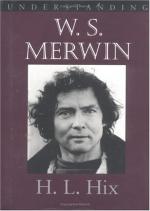|
This section contains 3,992 words (approx. 14 pages at 300 words per page) |

|
SOURCE: Davis, Cheri Colby. “Time and Timelessness in the Poetry of W. S. Merwin.” Modern Poetry Studies 6, no. 3 (winter 1975): 224-36.
In the following essay, Davis discusses Merwin's use of time in his poetry, focusing on such poems as “The Counting Houses,” “The Last People,” and “The Port.”
My particles of time play with eternity.
—Antonio Porchia
In the final version of his Scienza Nuova (1744), Giovanni Battista Vico conceives of time—historical time—not as a straight line, but as a process of recurrence. Nations constantly wax and wane. Early in our own century, Oswald Spengler described anew the struggle of youthful nations to sustain themselves, in the face of scarcity, their prosperous growth with age, and then their decline: He saw man now experiencing the decline of the West. W. B. Yeats took up and developed a similar view of historical time in A Vision. Yeats saw the...
|
This section contains 3,992 words (approx. 14 pages at 300 words per page) |

|


